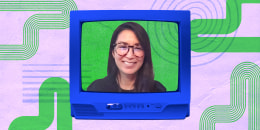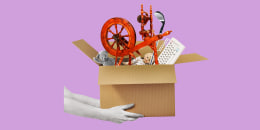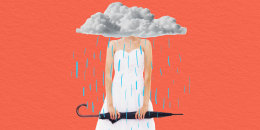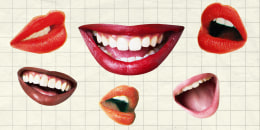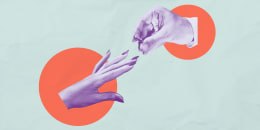The comments on my Instagram reel rolled in faster than I could delete them.
“No kids, not married, and 37, just a big child with no responsibility and never done anything useful, pathetic cow.”
“Sad. Something is wrong with her.”
“Another one trying to prove that she’s happy inside.”
“Post a video again in your 40s when you have 8 cats, and no man wants you.”
“You’ll die alone. Probably no one will miss you really.”
Hundreds of comments per hour telling me I was pathetic and cringey and that feminism had deluded me into believing I was happy. Strangers — they appeared to be primarily men, many with photos of presumably their own daughters in their profile pictures — were resharing my content all over the world with their own text overlaying it explaining how women like me were ruining civilization, “glamorizing feminism,” and we — I — would die alone.
What had I done to bring on this onslaught of negativity and harassment? I’d posted an Instagram reel that simply said, “Age 37: Never married. No kids,” over a montage of travels in my 30s. Initially, I wrote out a long caption (as I’m known to do) explaining my thought process in sharing my version of the social media trend in which people post their age and showcase their interesting lives, sans children. I was going to explain that this — being unmarried and without any kids — hadn’t been my plan for my life, that it’s just what had happened so far — and I’m not waiting on anyone or anything to live. But I decided at the last minute after a glass of wine at the airport lounge that I didn’t need to over-explain myself (famous last words, right?) and simply captioned the video with, “Just livin’ life. Very happily.”
At first, the response was as expected. I’ve been an influencer for nearly a decade, so I am used to the one-off negative comments — the ones I can easily block and delete without another thought. But somewhere along the way, the response shifted — dramatically. Millions of people had seen my post, and I woke up with hundreds of new comments, nearly all hurtful. From primarily men, but also women, many with Bible verses and “kindness” in their bios, telling me every variation of “you will die alone” and “no one wants you anyway” that they could muster.
I tried to delete and block, but it quickly became too overwhelming. That first week, I don’t think I slept more than 30 minutes at a time. I received messages and emails for months (still am), telling me how sad my life is, mocking my appearance, all of them with some version of the same message: “You’ll die alone.”
Immediately after the backlash, I tried to explain online through follow-up posts and stories that I never said that having or not having kids, or being married or unmarried, was better than the other. “This is just where my life is now,” I often repeated. “I’m just making the most of it. I never said I didn’t want those things; I just don’t have them now.” But there were still hundreds — thousands — of strangers projecting their thoughts onto me and refusing to believe what I said about myself was true. Refusing to believe that I was happy. That I am happy.
“I think I got onto the tradwife side of the internet,” I told a friend a few days after my post went viral. At that point, I did not know much about the phenomenon gaining momentum on social media of “soft girls” and “tradwives” (traditional wives). The trend is of dependence, with wives and girlfriends online sharing their homemaking and child-rearing, and their decision to not work outside the home, as the only honorable option for women — not one of many. I believe these “traditional values” adherents would say that I, a now 38-year-old woman who is unmarried and childless, am what’s wrong with the world.
And they sure did.
For months after the post, I was on edge whenever I opened Instagram. The app that makes up a large percentage of my livelihood had become something I feared. I stopped posting much, almost nothing personal, and nothing from my home. I didn’t look at messages or read comments, and I second-guessed everything I wrote. “I think I’m having a crisis of confidence,” I told a mentor, not understanding the magnitude of my feelings.
But soon, I realized the feeling I tried to minimize by describing as “on edge” was much more — it was crippling anxiety and, I’m able to see in hindsight, depression. I didn’t sleep well for months. I had digestive problems, low energy, panic attacks, angry outbursts, and my skin started breaking out. I was gaining weight and finding any reason to stay home and isolate myself. I chalked it up to winter and the lack of sunlight, but it wasn’t the lack of sun — I had broken.
Sharing my life with others had given me so much confidence in the past, but now my life itself had been belittled to the point where I couldn’t help but inadvertently take some of it on. “It’s not normal to have this much negativity thrown at you,” I tried to explain to friends, but the truth is not many people have ever or will ever experience anything like this. There is no road map or DSM diagnosis for going viral, but as I now know from my experience, it can be life-altering.
'It's not normal to have this much negativity thrown at you,' I tried to explain. ... There is no road map or DSM diagnosis for going viral.
My entire brand online is about inspiring solo female travelers. I’ve visited all 50 states and nearly every U.S. National Park completely alone, as a challenge to myself. But again, just because that’s what’s happened in my life thus far, I don’t believe it is the only or best way. So, while my instinct was to share my struggles after being harassed online on Instagram, I haven’t been very open about it until now, as it felt like I was betraying the very people I set out to inspire by admitting that I let this criticism seep in even a little. That I had been rattled. To admit that I wasn’t strong enough to handle internet bullying felt like another blow, and I had been dealt enough of those already.
My Instagram reel has now been seen over 16 million times, with over half a million likes and tens of thousands of shares. And despite the negativity, through lots of inner work — taking long social media breaks, sharing less, and speaking with friends and professionals — I’m coming out on the other side and can realize the positives. I have thousands of new followers, and many women have sent me messages that the reel I shared, did, in fact, inspire them. So I’ll keep sharing, but with a bit of a shield, for now. I want to use my experiences to clear the field for others, and I believe vulnerability and honesty are how to do it.
But I don’t want to lose myself again along the way.
